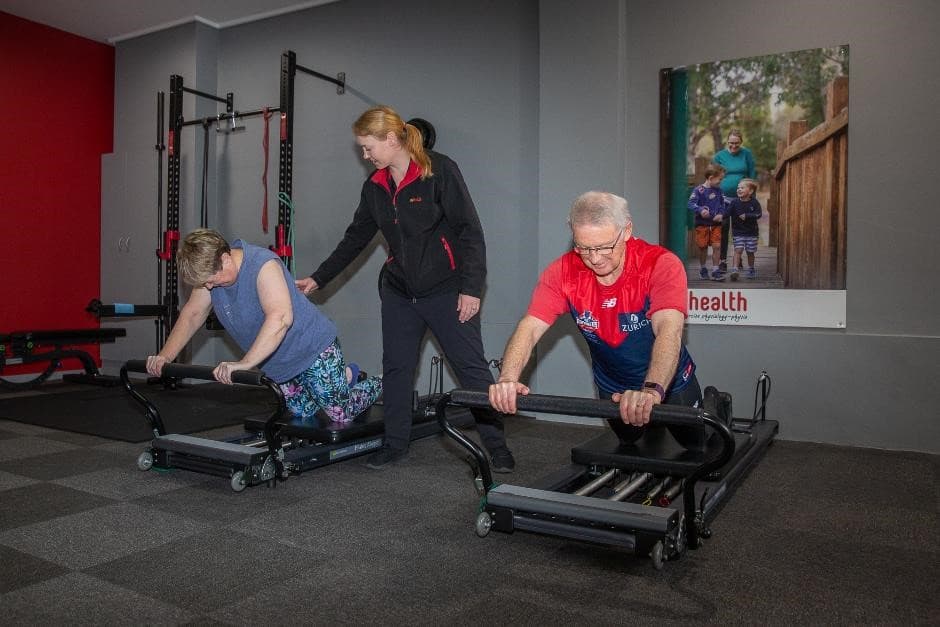Welcome! Whether you’re a newcomer or a seasoned practitioner, you might be wondering how long it takes to see results from your Pilates program.
In this friendly and informative blog post, we’ll explore the timeline for physical and mental benefits, including:
- Recommended frequency and duration of practice
- The role of individual variation
- Measuring results and
- Staying motivated in your Pilates journey.
Let’s dive in!
Physical Results from Pilates
While individual experiences will vary, many people begin to notice physical improvements within a few weeks of consistent Pilates practice (usually the initial results within about 3 weeks) This is because even in the first few weeks, your ability to activate the correct muscles and be aware of your posture begins to improve.
In particular, these changes can include better posture, increased flexibility and improved core muscle activation.
However, the timeline can be influenced by factors such as your starting fitness level, the type of Pilates you’re practicing (mat or equipment-based), and the quality of instruction you receive.
As a general guide, the first significant improvements in function start to occur at the 6-7 week mark. This is because at this stage your body has started to make more efficient neural (nerve) connections into the muscles, so that when the muscles contract, they can better match the force required. As a result, even though there has not been a change in the size of the muscles, the strength has improved.
The next most significant changes at the 13 week mark. At this stage, the growth of the muscles has begun to occur (hypertrophy), which has resulted both more muscle and stronger muscles. Your muscles continue to grow and become stronger from 3 months to 12 months, but at a slower rate.
Improvements in posture from Pilates
One of the most noticeable outcomes of Pilates is an improvement in posture. Pilates not only enhances your posture but also makes you look taller and more confident.
This is achieved by focusing on alignment, balance, and core strength, which together create a strong foundation for your body.
As you become more aware of your body’s alignment, you’ll naturally start to maintain a healthier posture, which can lead to a more positive body image.
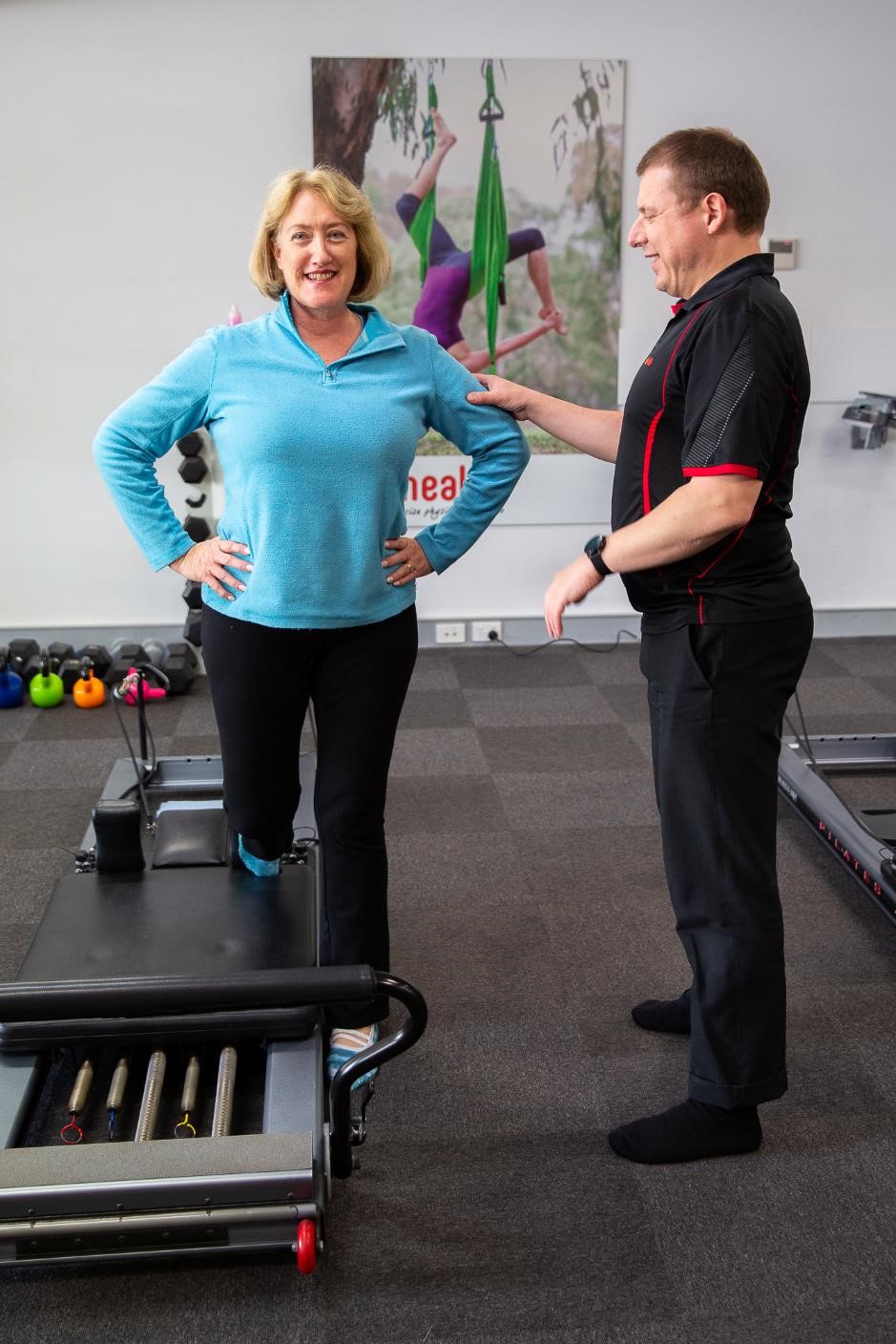
Improvements in flexibility from Pilates
Another significant benefit of Pilates is increased flexibility.
The exercises involved in Pilates stretch and strengthen your muscles simultaneously, resulting in a more flexible and supple body. The interesting contradiction from Pilates is that as you impprove the stability of your joints (with improved stabilising muscle activity around the joints), your body feels more in control, so you are able to move through larger ranges of movement and gain flexibility. More control = more flexibility.
This increased flexibility can lead to a greater range of motion, reduced muscle stiffness, and an overall more graceful appearance.
As your body becomes more limber, you may find that your body image improves as well.
Furthermore, Pilates focuses on developing a strong and stable centre, which includes the muscles of the abdomen, back, and pelvis.
A strong core is essential for maintaining balance, stability, and overall body strength. As you progress in your Pilates practice, you’ll notice leaner and more toned muscles, leading to a more defined and sculpted physique.
This enhanced physical appearance can contribute to a more positive body image.
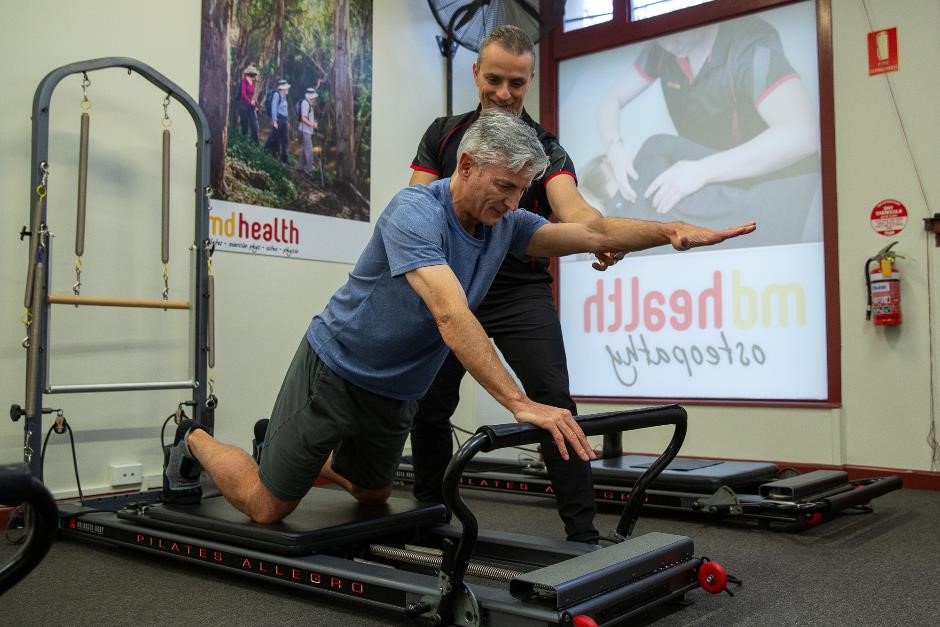
Mental Benefits of Pilates
The mental and emotional benefits of Pilates can be just as significant as the physical ones. Many practitioners report feeling more relaxed, focused, and in tune with their bodies after a session.
These mental benefits can be experienced relatively quickly, often after just a few sessions.
As you continue your practice, you’ll likely notice even more significant improvements in stress management and overall mental well-being.
Frequency and Duration of Practice
If you’re looking to build muscle through Pilates, consistency and dedication are essential. That’s why I recommend committing to:
- 2-3 Pilates sessions per week (To give your body the right stimulation to grow and improve AND the appropriate amount of rest)
- (Rest is a very important part of the program. Your muscles grow when you rest, NOT when you exercise. Having enough time for recovery allows for the best results https://mdhealth.com.au/the-importance-of-rest-and-recovery/)
- For at least 13 weeks.
- (The minimum amount of time for real changes in muscle strength and growth)
During this time, your body will undergo a gradual process of muscle growth and adaptation, as your muscles become stronger and more toned with each session.
By sticking to a regular schedule and pushing yourself to try new exercises and challenges, you’ll see even greater results in terms of muscle development and overall fitness.
Each session should last between 30 minutes, allowing enough time for a full body workout that targets all major muscle groups.
As you progress through your Pilates program, you may find that you need to increase the frequency and intensity of your workouts to continue challenging your muscles and seeing results.
This can involve adding more weight, reps, or variations to your exercises, or incorporating new equipment like resistance bands or weights.
Ultimately, the key to muscle growth through Pilates is to stay committed, stay consistent, and stay open to new challenges and experiences. With time and practice, you’ll develop stronger, leaner muscles that support your overall health and well-being.
Individual Variation
Everyone’s journey with Pilates is distinct and factors such as age, fitness level, and overall health have a considerable impact on how quickly you’ll notice progress.
For example, younger individuals with a higher starting fitness level are likely to see results more rapidly than older adults or those managing health conditions.
However, this should not discourage anyone from embarking on their Pilates journey. The true secret to success lies in patience, perseverance, and consistent, quality practice.
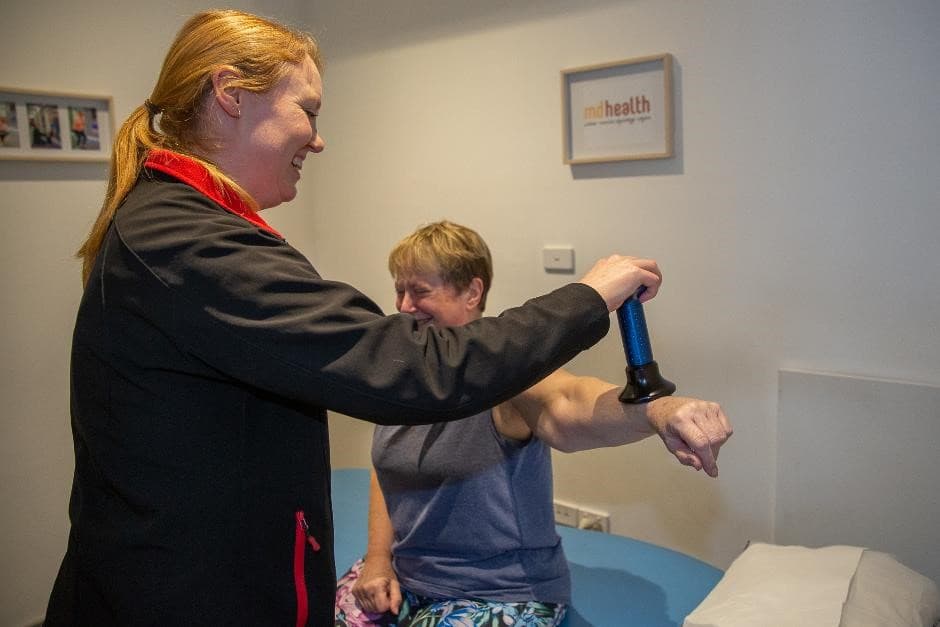
Measuring Results
To track your progress, physiotherapists, osteopaths and exercise physiologists can provide expert assessments, determining how much stronger you’ve become as you continue to practice.
As, focusing on increasing strength is crucial in Pilates, as it is an excellent method for building overall body strength, particularly in your core muscles. In addition to strength,
Pilates encourages increased mobility and flexibility in your joints, allowing you to move more freely and comfortably.
Professional assessments by experts will help you monitor the improvements in your range of motion, ensuring that you’re on the right track in your Pilates journey.
Physiotherapists and exercise physiologists can help you measure your progress in this area and provide tailored guidance to ensure you continue to improve.
Lastly, enhancing your flexibility is a vital aspect of Pilates.
A regular practice will lead to greater flexibility in your muscles and connective tissues, allowing for more fluid movement and reducing the risk of injury.

Sticking with the Practice
By sticking to a consistent routine, you’ll be unlocking a myriad of benefits that will positively impact your overall well-being.
One of the most significant advantages of maintaining a regular Pilates practice is the increased flexibility and range of motion you’ll experience.
With each session, your muscles and connective tissues will gradually become more supple and elastic, allowing for smoother, more fluid movements.
This increased flexibility will help prevent injuries and make everyday tasks easier and more enjoyable.
But that’s not all! As you continue to immerse yourself in the Pilates world, you’ll also notice a remarkable improvement in your overall strength.
The unique exercises in Pilates target deep muscles that often get neglected in traditional workouts.
By fortifying these muscles, you’re effectively building a strong foundation for your entire body, making you more resilient to injuries and promoting better posture and alignment.
Moreover, as you develop your Pilates practice, you’ll find that your range of motion improves significantly.
This increased mobility will not only make you more agile but will also help reduce the risk of injury.
In fact, many athletes and fitness enthusiasts turn to Pilates as a way to enhance their performance and protect their bodies from potential harm.
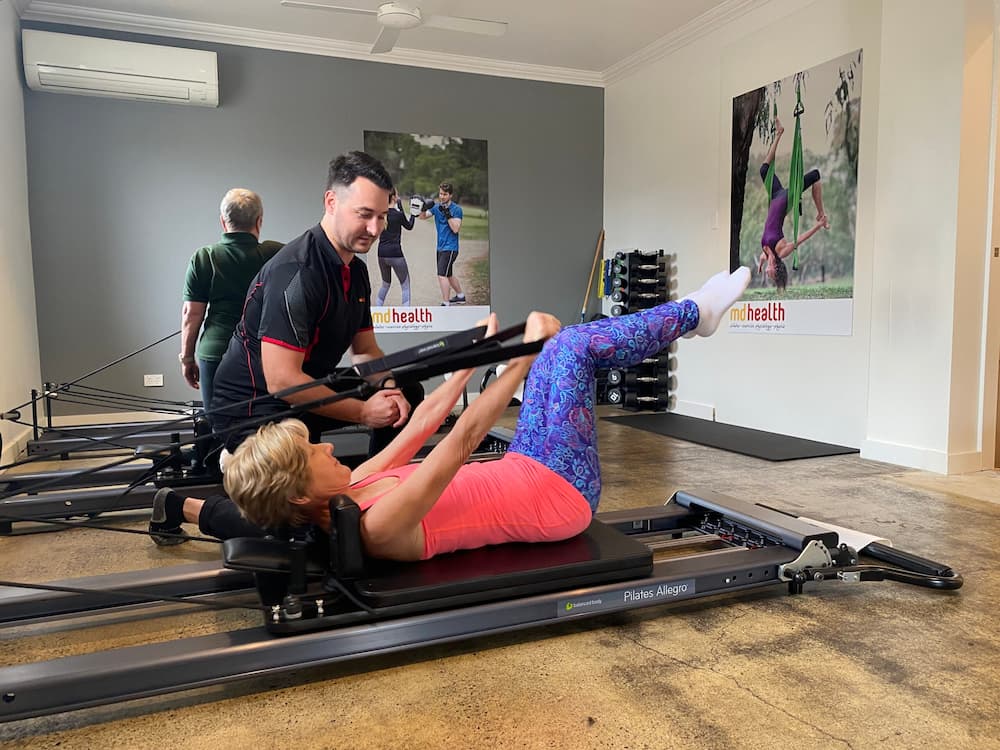
The Benefits of Pilates for Overall Physical and Mental Health
The benefits of Pilates go beyond the physical realm, It is far more than just an exercise routine for sculpting a toned body. It boosts your mental well-being as well.
One of the ways Pilates positively impacts your mental health is by aiding stress management.
The emphasis on deep, mindful breathing in Pilates helps alleviate stress and anxiety. As you become more in tune with your body, you’ll find it easier to let go of tension and feel more relaxed in your daily life. Deep breathing activates your parasympathetic nervous system. This is the opposite to effects adrenaline (your fight or flight reasponse). As a result, you
- Reduce your heart rate
- Slow your breathing
- Dampen down your fight and flight response
Pilates also enhances self-awareness by encouraging you to listen to your body and understand its signals.
This heightened self-awareness can help you make better choices for your health and well-being, both on and off the mat.
Furthermore, many practitioners report improved sleep quality after incorporating Pilates into their routines.
The combination of physical exertion and mental relaxation can help you fall asleep faster and enjoy a more restful slumber.
Conclusion
In summary, you can expect to see results from your Pilates practice within a few weeks to a few months, depending on various factors.
Remember that consistency, quality instruction, and patience are essential components of your Pilates journey.
If you’re interested in finding out more about Pilates and how it can benefit you,
I invite you to visit MD Health or get in touch with one of our friendly physiotherapists or exercise physiologist.
We’d be more than happy to help you explore the world of Pilates and guide you on your journey to improved strength, flexibility, and balance.
Embrace the process, stay committed, and enjoy the numerous physical and mental benefits that Pilates has to offer. Happy practicing!
Do you have any questions?
Call us on (03) 9857 0644 or (07) 3505 1494 (Paddington)
Email us at admin@mdhealth.com.au
Check out our other blog posts here
Our clinical staff would be happy to have chat if you have any questions.
Take the first step to a healthier you!
Would you prefer for someone to contact you to book your FREE Full Body Assessment*?
Please fill in this form and someone from MD Health will be in touch with you soon.
Alternatively please call us on:
07 3505 1494 (Paddington – Brisbane (QLD) Clinic)
Or email us:
admin@mdhealth.com.au (VIC) paddington@mdhealth.com.au (QLD)
*Please note only the Full Body Assessment is a FREE service. The Full Body Assessment is for new clients at MD Health or returning clients who haven’t been in for 6 months or longer who intend to particpiate in our 13 Week Clinical Pilates Program**.
For all new clients who wish to come in for a one-off, casual or adhoc basis for Physiotherapy or Exercise Physiology the Initial Physiotherapy or Initial Exercise Physiology appointment is a paid service.
** The 13 Week Clinical Pilates Program at MD Health is not a lock in contract and you are not required to attend for the full 13 weeks if you do not wish.
This site is protected by reCAPTCHA and the Google Privacy Policy and Terms of Service apply.

